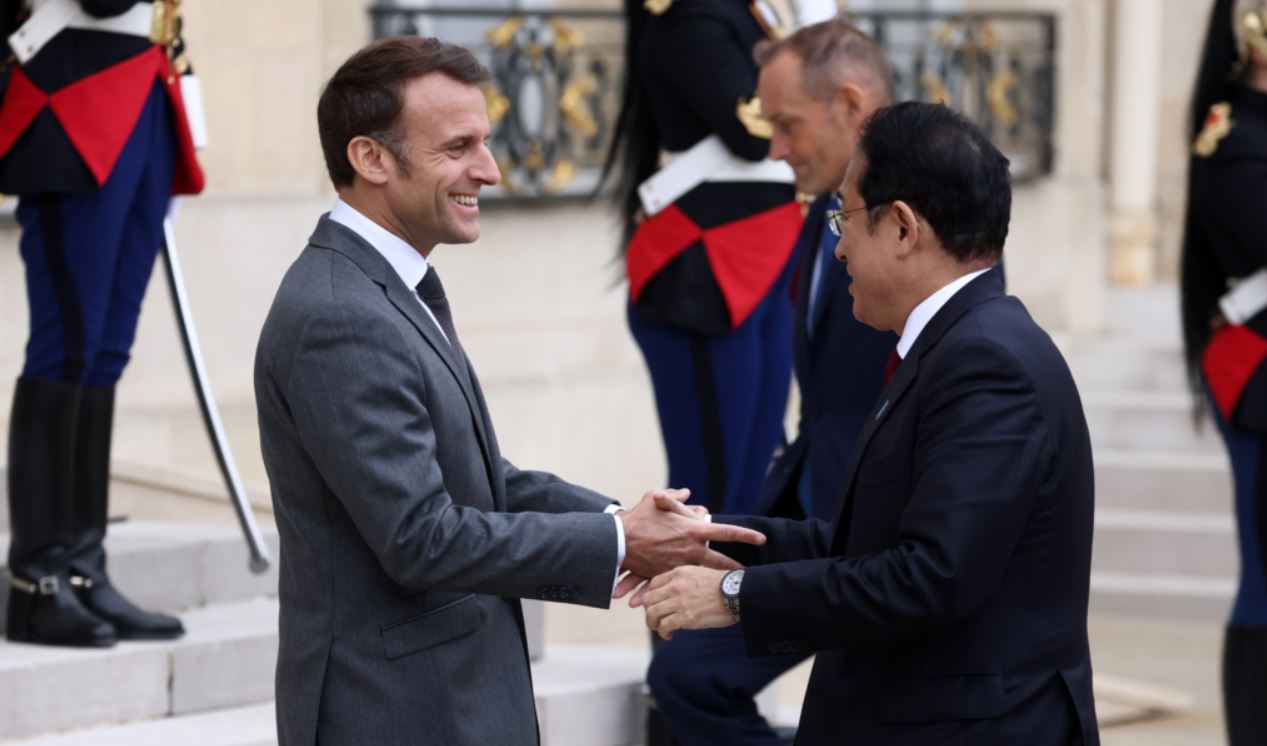Kishida deserved the warm embrace Macron gave Xi
Japan PM's low-key visit to Paris yielded significant bilateral initiatives. French President Emmanuel Macron rolled out the red carpet to greet Chinese President Xi Jinping this week, hoping to somehow persuade him to curb his country's support for Russia's war in Ukraine and to play by international trade rules.

Yet despite all the pomp, there was not all that much of substance to celebrate as China and France marked the 60th anniversary of their establishment of diplomatic ties. By contrast, Japanese Prime Minister Fumio Kishida's low-key visit to Paris just ahead of Xi highlighted a relationship of two partners with much in common and lots to talk about.
Kishida was ostensibly in Paris to chair a meeting of the Organisation for Economic Co-operation and Development (OECD). Yet he managed to meet with both Macron and Prime Minister Gabriel Attal, securing agreements on supply chains for critical minerals and the launch of negotiations for a reciprocal access agreement to facilitate joint military training and exercises.
While Paris and Beijing differ over fundamental political values and have competing visions for global order, Japan and France largely see eye to eye about the importance of democratic principles, multilateralism and a rules-based order.
This can be seen particularly in terms of the Ukraine war. Japan has consistently and robustly supported Kyiv, with its contribution of $12 billion in aid, making it Ukraine's largest Asian donor by a significant margin.
This help has included nonlethal military aid, with Tokyo reworking its restrictions on the export of defense equipment. That policy change cleared the way for the sending of Patriot air defense systems manufactured under license in Japan to the U.S. to replace units sent to Ukraine.
Tokyo has also played an important role in keeping Ukraine on the international agenda, as highlighted by Kishida's inclusion of President Volodymyr Zelenskyy at the Group of Seven summit in Hiroshima a year ago, and moves to persuade Global South countries of the need to respond to Russian aggression.
More generally, Macron and Kishida see their countries as having leading roles to play in shaping the emerging world order.
This includes advocating for a reform of global governance systems, such as the expansion of the permanent membership of the U.N. Security Council to include Japan and others, bridging gaps between the Global North and South, and contributing to the regulation of climate and infrastructure financing, digital governance and the use of artificial intelligence. Kishida spoke on many of these themes while chairing sessions at the OECD.
Japan, as the world's third-largest provider of official development assistance, is actively supporting the decarbonization of developing Asian economies. This dovetails with initiatives from Macron, such as the Paris Agenda for People and the Planet adopted last June.
Japan is also a staunch supporter of a strong, united and powerful Europe, bolstering its bilateral relationship with the EU with cooperative projects involving the green and digital transitions, as well as security, exemplified with the launch of a Japan-EU strategic dialogue last year. These moves align with Macron's core interest in ensuring the survival of the EU, reinforcing its sovereignty and making it a true geopolitical player.
Japan and France regard each other as key partners in realizing a free, open, prosperous and inclusive Indo-Pacific region, including the upholding of the law of the sea. A close strategic dialogue is conducted through an annual meeting of the pair's foreign and defense ministers.
The pending reciprocal access agreement will support security collaboration in French Pacific territories of shared interest, including New Caledonia and French Polynesia. As outlined in a new road map for bilateral cooperation issued last December, Paris and Tokyo are aiming to coordinate efforts to address maritime security, climate change, humanitarian assistance, disaster relief and digital connectivity.
Japan thus is emerging as a key like-minded partner for France, despite low-profile communications and occasional difficulties, primarily stemming from frustrations regarding lengthy bureaucratic processes and enduring misperceptions.
French officials tend to perceive Japan as overly aligned with the U.S. and too assertive toward China, while their Japanese counterparts regard France as sometimes too yielding toward Beijing. Such concerns were fed by Macron's controversial comment last year, as he made his way back from a visit to China, that Europe should avoid getting dragged into a conflict in the Taiwan Strait.
It would make sense for France and Japan to embrace each other more closely, given the alignment of their positions. Japan's multifaceted approach toward China, which includes deterrence, counterbalancing and conditional cooperation, against a backdrop of guarding its economic security, shares many similarities with the French and European "de-risking" stance that views China as a partner, competitor and systemic rival.
Unlike the challenges present in France's relations with China, where fundamental differences in values and interests persist, difficulties related to misperceptions in Paris' relationship with Tokyo could be easily addressed through enhanced dialogue and consultation.
Now is the time for France and Japan to raise the visibility of their partnership and elevate strategic communications. Such steps could fortify bilateral bonds and lay the groundwork for expanded multifaceted cooperation, especially against the uncertain backdrop of the upcoming U.S. election.
>>> Read the article on Nikkei Asia's website.

Media:
Share






